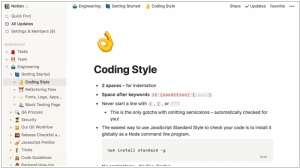Google Calendar vs Notion
September 10, 2023 | Author: Adam Levine
11
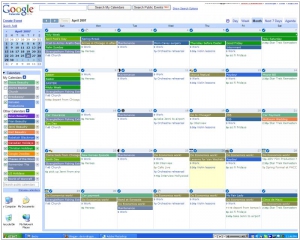
Google Calendar is a free time-management web application offered by Google. The Ajax-driven interface enables users to view, add, and drag-and-drop events from one date to another without reloading the page. It supports view modes such as weekly, monthly, and agenda. Google Calendar allows multiple calendars to be created and shown in the same view. Each can be shared, either read-only or with full edit control, and either with specified people or with everyone (public calendars).
Google Calendar and Notion are both popular tools for organizing and managing schedules and tasks, but they have key differences in their features and focus.
Google Calendar is a dedicated calendar application that provides robust scheduling and time management capabilities. It offers features such as creating and managing events, setting reminders and notifications, integrating with other Google services like Gmail, and sharing calendars with colleagues or friends. Google Calendar is known for its simplicity, ease of use, and seamless integration with the Google ecosystem. It is a reliable tool for individuals and teams to stay organized, schedule meetings, and track important events.
Notion, on the other hand, is a versatile all-in-one workspace that combines note-taking, project management, and collaboration features. While it includes a calendar view, Notion's primary focus is on creating and organizing content, including documents, databases, to-do lists, and kanban boards. Notion allows users to create custom templates, collaborate with others, and link information across different pages. It provides flexibility and customization options for tailoring the workspace to individual needs.
See also: Top 10 Productivity software
Google Calendar is a dedicated calendar application that provides robust scheduling and time management capabilities. It offers features such as creating and managing events, setting reminders and notifications, integrating with other Google services like Gmail, and sharing calendars with colleagues or friends. Google Calendar is known for its simplicity, ease of use, and seamless integration with the Google ecosystem. It is a reliable tool for individuals and teams to stay organized, schedule meetings, and track important events.
Notion, on the other hand, is a versatile all-in-one workspace that combines note-taking, project management, and collaboration features. While it includes a calendar view, Notion's primary focus is on creating and organizing content, including documents, databases, to-do lists, and kanban boards. Notion allows users to create custom templates, collaborate with others, and link information across different pages. It provides flexibility and customization options for tailoring the workspace to individual needs.
See also: Top 10 Productivity software
Google Calendar vs Notion in our news:
2024. Notion acquires privacy-focused productivity platform Skiff
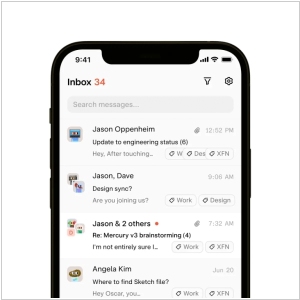
Notion has acquired Skiff, a platform established in 2020 by Andrew Milich and Jason Ginsberg, which specializes in providing end-to-end encrypted file storage, document management, calendar functionalities, and email services. Skiff initially garnered $14.2 million in funding and positioned itself as a secure alternative to Google Docs, expanding its offerings to include productivity solutions like calendars and emails. Skiff announced its integration with Notion on its website, along with the decision to discontinue its services after a transition period of six months. The company assured users that their Skiff accounts would not be automatically converted into Notion accounts but emphasized the ease of exporting or migrating data to other platforms.
2024. Notion launches a stand-alone calendar app
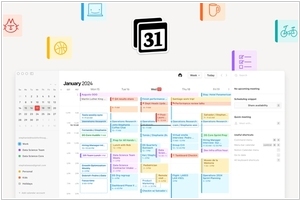
Notion, a widely used platform for note-taking and project management, has introduced a dedicated calendar service, drawing from its acquisition of the well-designed Cron calendar app in 2022. Positioned as a free next-generation iteration of Cron, Notion Calendar incorporates a built-in scheduling tool reminiscent of Calendly and offers optional deep integration with Notion. Accessible on Mac, Windows, iOS, and the web (with an Android app in development), the calendar seamlessly merges work and personal calendars, providing users with a unified view for effective day management. Although Notion has previously featured a calendar view within workspaces, it now integrates with external calendars, starting with Google Calendar. Emphasizing its standalone nature, users can opt for Notion Calendar as a standalone smart calendaring service, but for Notion users integrating it into their workflow, there's the added benefit of attaching Notion docs to calendar events, fostering better preparation and alignment within teams.
2023. Gmail brings in Calendly-style availability sharing from Google Calendar
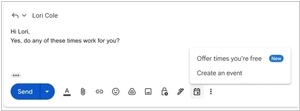
Google has introduced additional functionalities to Gmail that pertain to scheduling, in conjunction with Google Calendar integration. These new features include the ability to swiftly create events and easily share availability. In the conversation view of Gmail, a calendar icon now resides at the bottom, offering two options: "Create an event" and "Offer times you're free." The "Create an event" button functions straightforwardly by generating a Google Calendar event, with the email subject serving as the event name and the email recipients as participants. Moreover, it produces a meeting summary within the email body, enabling efficient sharing of meeting details. While this feature was previously accessible within Gmail's three-dot menu, it now boasts greater prominence and accessibility.
2021. Notion acquires India’s Automate.io in push to accelerate product expansion
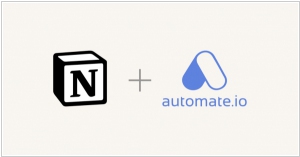
Workplace productivity startup Notion has recently acquired Automate.io, an Indian startup renowned for developing connectivity and integrations with more than 200 services. This acquisition serves as a strategic move for Notion to expedite its product expansion and enhance its appeal to the growing number of individuals and businesses transitioning to digital collaborative tools. With the addition of Automate.io, Notion gains valuable insights into the 200 integrations the Indian startup has built. This knowledge will enable Notion to empower users and enterprises by incorporating their workflows seamlessly into the Notion platform.
2020. Online workspace startup Notion raises $50M
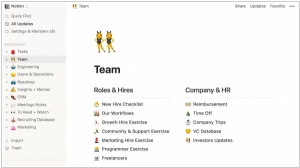
Online workspace startup Notion has secured $50 million in fresh funding, valuing the company at $2 billion. Established in 2016, Notion offers a comprehensive workspace solution encompassing note-taking, task management, wikis, and databases. Its unique proposition lies in consolidating various work applications into a single platform, making it ideal for efficient task and project management. Notably, amidst the global COVID-19 pandemic, Notion's remote work support played a significant role in attracting investors. The company experienced a surge in new customer sign-ups, setting new records, as remote working became the norm due to the pandemic. The exponential growth of remote work in 2020, spurred by COVID-19, has significantly bolstered the user base of remote work tool providers across different industries.
2018. G Suite apps and Google Calendar are getting Gmail’s side panels
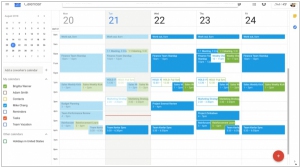
The new Gmail boasts a notable feature: a convenient quick-access side panel that provides easy navigation to Google Calendar, Tasks, Keep, and Gmail extensions. Now, Google is extending this functionality to other applications within the G Suite, including Google Calendar, Docs, Sheets, Slides, and Drawings. In Google Calendar, users will have swift access to Keep and Tasks, while in the remaining G Suite apps, they will enjoy easy access to Calendar, Keep, and Tasks. G Suite subscribers on the rapid release schedule can already access this feature, while those on the slower release schedule can expect access within two weeks.
2018. Google Calendar gets an Out of Office mode

Google Calendar has introduced two new features: an "Out of Office" feature and customizable working hours. By setting working hours, you can indicate your availability to others, and Google Calendar will automatically decline meeting requests that fall outside of these designated hours. When creating an event using Google Calendar on the web, you now have the option to select the "Out of Office" calendar entry type. For instance, if you are scheduling your vacation dates, you can mark the event as "Out of Office." During this period, if others send you meeting invitations, Google Calendar will automatically decline them, without requiring your intervention.
2018. Google Calendar now lets you add a message when you change an event
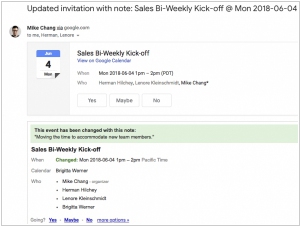
Google Calendar has introduced a valuable new feature. Whenever you modify or delete an event, a dialog box will now appear, allowing you to include a brief message that explains the reason behind the change and outlines the specific modifications. This message will be displayed at the top of the event details section on both the event page in Google Calendar and in the email notifications sent to your guests regarding the update. With this automatic dialog box prompt, more users are likely to provide explanations for their changes compared to before. This feature is currently being rolled out to all G Suite users and is expected to become available to everyone, regardless of whether their administrators have opted for the rapid release or schedule release schedule, within the next three days.
2017. Google redesigned Calendar for web
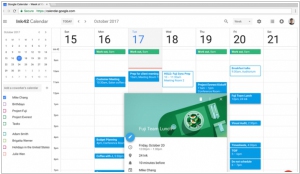
Google has introduced new updates for the web version of Google Calendar, granting PC users access to the sleek layout and user-friendly controls previously available exclusively on the mobile app version of this G Suite tool. With the redesigned calendar layout, the display automatically adjusts to optimize screen utilization. While most of the additional features accompanying the web redesign will prove beneficial for users within larger organizations, one particularly useful enhancement enables the simultaneous viewing of multiple users' calendars side by side for a selected day, facilitating schedule coordination. Moreover, Calendar Invites now support the inclusion of formatting and hyperlinks directly within the description field, while G Suite administrators gain the ability to provide more detailed information about conference rooms within their organization.
2017. Google Calendar improves integration with Microsoft Exchange
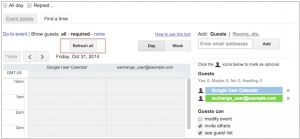
The latest update of Google Calendar brings good news for companies utilizing both Google's G Suite and its Microsoft alternative, Exchange, concurrently. With this update, G Suite administrators now have the ability to enable real-time visibility of free/busy information across both systems for their users. As a result, features such as Google Calendar's "Find a Time" and Outlook's "Scheduling Assistant" can seamlessly communicate with each other. Once these features are enabled by an administrator, they become accessible on Google Calendar for Android, iOS, and the web, as well as on all Outlook 2010+ clients across desktop, mobile, and web platforms.

